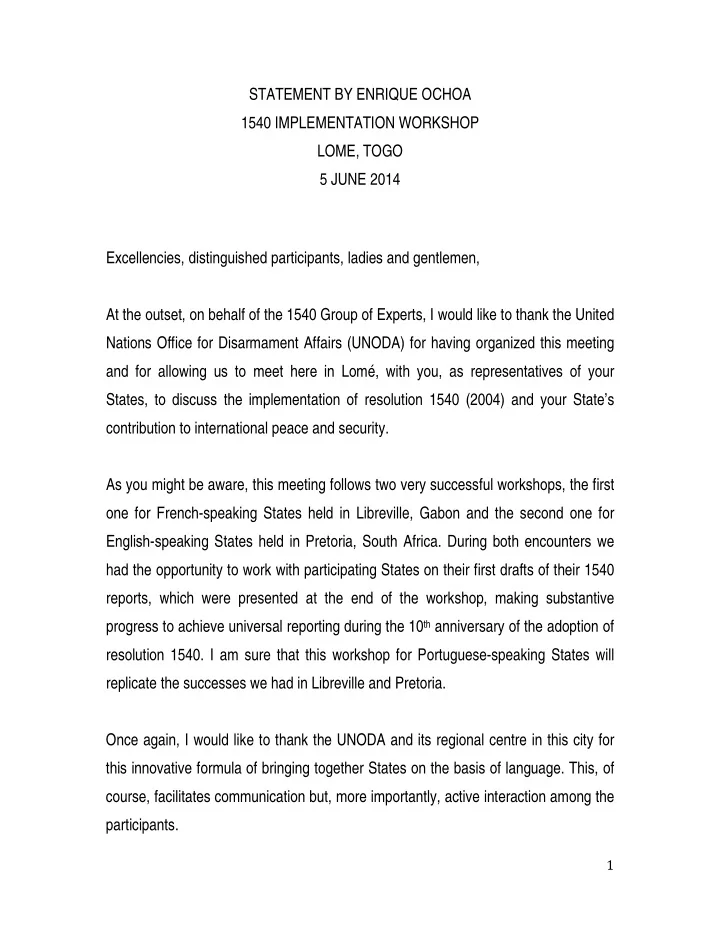

STATEMENT BY ENRIQUE OCHOA 1540 IMPLEMENTATION WORKSHOP LOME, TOGO 5 JUNE 2014 Excellencies, distinguished participants, ladies and gentlemen, At the outset, on behalf of the 1540 Group of Experts, I would like to thank the United Nations Office for Disarmament Affairs (UNODA) for having organized this meeting and for allowing us to meet here in Lomé, with you, as representatives of your States, to discuss the implementation of resolution 1540 (2004) and your State’s contribution to international peace and security. As you might be aware, this meeting follows two very successful workshops, the first one for French-speaking States held in Libreville, Gabon and the second one for English-speaking States held in Pretoria, South Africa. During both encounters we had the opportunity to work with participating States on their first drafts of their 1540 reports, which were presented at the end of the workshop, making substantive progress to achieve universal reporting during the 10 th anniversary of the adoption of resolution 1540. I am sure that this workshop for Portuguese-speaking States will replicate the successes we had in Libreville and Pretoria. Once again, I would like to thank the UNODA and its regional centre in this city for this innovative formula of bringing together States on the basis of language. This, of course, facilitates communication but, more importantly, active interaction among the participants. 1
As you are well aware, resolution 1540 (2004) requires all States to take a series of measures to impede the proliferation of weapons of mass destruction (WMD) to non- State actors. The role of the 1540 Committee is not only to monitor the implementation of the resolution but also to assist States in their implementation. The Committee works with States on a collaborative basis and in a cooperative spirit and plays a very important role in facilitating assistance for the implementation of resolution 1540 (2004), through its clearing-house function. The unanimous adoption of resolution 1540 in 2004 was a clear affirmation of the international community’s resolve to counter the threat of proliferation of WMD to non-State actors and their catastrophic use of such weapons. However, this resolve has to be backed by the sustained cooperation of all stakeholders, since the global effectiveness of the resolution is only as strong as the weakest link in the chain. Terrorist and non-State actors will exploit gaps and vulnerabilities to carry out their criminal activities. The resolution can only be really effective if all States implement their obligations. I will only refer to these obligations briefly, since my colleague Bennie Lombard will talk about them in greater detail. The main obligations of resolution 1540 are: refraining from providing any form of support to non-state actors that attempt to develop, acquire, manufacture, possess, transport, transfer or use nuclear, chemical or biological weapons and their means of delivery; adopting and enforcing appropriate effective laws to prohibit and prosecute such activities; and, establishing domestic controls over materials, equipment and 2
technology which could be used for the design, development, production or use of WMD and their means of delivery. Besides these obligations, the Security Council and the 1540 Committee have encouraged States to provide information on their implementation of the resolution, and called on those that have not yet submitted a national report to do so. The value of Member States’ inputs cannot be overemphasized. They serve as the basis upon which the Committee can conduct dialogue with States on their implementation of the resolution, including on facilitating assistance. As we commemorate the 10 th anniversary of resolution 1540 this year, it is very encouraging to note that 172 States have reported to the Committee on their implementation, the latest one being Lesotho. We hope that the representative of Brazil who is participating in this workshop will share with us his country’s experiences in presenting a 1540 report and that you might draw some useful ideas as your States prepare their first reports. There are still 21 States that have yet to submit initial reports. I hope that this workshop will bring us closer to the objective of reaching universal reporting during the year of the 10 th anniversary of the adoption of the resolution. My colleague Bennie Lombard and I stand ready to work with you not only during the coming days but also from our office in New York after this workshop. We sincerely hope that the exchanges in this workshop are useful and inspiring. I thank you for your attention. 3
Recommend
More recommend